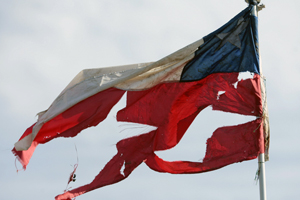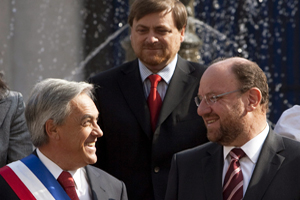Pledge drive
Chilean students at Chicago raised funds for earthquake relief on campus and from alumni at home.
By Jason Kelly
Photography by Newscom

A student group raised more than $20,000 in four days for their battered homeland.
Alejandro Perez, AM’77, experienced a personal aftershock in the wake of Chile’s Feburary 27 earthquake. The university where he’s president, Universidad San Sebastian, suffered minimal damage despite being near the epicenter in Concepción, but a few days later six university officials died in a plane crash.
The officials had flown from Santiago March 1 to set up shelters on campus. The plane crashed north of Concepción, killing everyone on board and making the national tragedy a personal one for the Perez family. “All my dad’s partners and friends died,” said his son, Chicago business and public-policy student Eduardo Perez.
Even before that jolt, the younger Perez had begun coordinating assistance to Chile from Chicago. Watching reports of the devastation from the 8.8-magnitude quake on the Chilean national television network, he felt helpless. It was a Saturday night, just after midnight Chicago time, and Perez scrambled to learn what he could about his family back home.
His grandfather’s farm in southern Chile suffered damage, but all his relatives and friends had survived. The University’s 20 other Chilean students heard similarly reassuring news, according to the Office of International Affairs, and there were no injuries among the Chicago students studying there at the time. Equipment in the Atacama desert where University astronomers and astrophysicists conduct research also was unharmed.
Although Perez, like others on campus, was relieved on a personal level, the television images were unsettling. Hundreds of people were killed, and the destruction—estimated at nearly $30 billion—affected millions. The next day, he and fellow Chilean Chicago Booth students Oscar Boettiger and Christian Diaz met at the Harper Center cafeteria to plan a campus-based aid effort.
They were moved to act, Perez says, not only by their personal connections to the country but also because of the University’s longstanding relationship with Chile, which they felt would inspire significant support. The relationship dates to a 1956 partnership between the economics departments at Chicago and the Universidad Católica.
In the decades that followed, Chilean economic policy makers and scholars—often graduates of one or both universities and students of Milton Friedman, AM’33—became known as the “Chicago Boys.” Many came to prominence as government ministers in the mid-1970s, when their free-market reforms were implemented to stop inflation and prevent an economic collapse, and the affiliation continues today.

Foreign minister Moreno (right) is one of four Chicago alumni in Chile’s cabinet.
In addition to the 12 Chilean students at Chicago Booth, four at the Harris School, and four in other divisions this academic year, the University continues to have a presence in the country’s government. Four of new president Sebastian Piñera’s 22 cabinet members are Chicago alumni: economy minister Juan Andrés Fontaine, AM’80; foreign minister Alfredo Moreno, MBA’82; education minister Joaquín Lavin, AM’79; and Secretary General Cristián Larroulet, AM’80, who will receive a Professional Achievement Award at June’s Alumni Weekend Convocation.
The University’s connection with the country runs so deep that a March 1 Wall Street Journal column declared that Friedman had “saved Chile.” Foreign-affairs columnist Bret Stephens, AB’95, wrote that Friedman’s “spirit was surely hovering protectively” to prevent the earthquake from becoming an apocalypse. In Haiti a quake 500 times weaker killed hundreds of thousands and cut a swath of destruction that made Chile’s damage seem minor by comparison.
Friedman’s influence in Chile is, of course, controversial. Critics argue that the reforms—intended to stop a financial freefall that began under President Salvador Allende—increased economic inequality, and that strong government building codes, as opposed to free-market economics, prevented greater damage.
Economics-department senior lecturer Victor Lima, AM’96, PhD’01, witnessed the Chicago Boys’ reforms while growing up in Chile. He credits them for building the country’s relative economic strength that helped it endure the disaster. “I became an economist because I saw the Chicago people do the reforms in Chile,” Lima says. “When you see economics at work and you see how powerful it can be in terms of improving people’s lives, it is hard to ignore.”
For the Chileans at Chicago, the earthquake’s effect on lives at home was impossible to ignore. Led by Perez, Boettiger, and Diaz—cochairs of the student-run Latin American Business Group—they rushed to respond. Diaz, adept at Web design, created a site for donations. Boettiger and Perez divided the campaign’s leadership responsibilities between campus locations, and by Monday, about two days after the quake, Chicago Helps Chile began in earnest.
Eventually all the Chilean students—“every single one of them,” Perez says—contributed not only money but time, collecting more than $10,000 on campus in four days. The spirit spread to Chile, where Chicago alumni donated online to the campus fund drive. In less than a week, the campaign raised $21,700, more than four times its goal. The money supported Chile Helps Chile, which likewise benefited from the Chilean people’s largesse. Featuring a 24-hour telethon days after the quake, Chile Helps Chile began with a $29 million goal and raised $58 million. “I feel good about my country because of these things, because of the response,” Lima says. “It was remarkable that things happened so fast and so efficiently and so effectively.”
Return to top
WRITE THE EDITOR
E-MAIL THIS ARTICLE
SHARE THIS ARTICLE
ALSO IN CHICAGO JOURNAL
COLLEGE REPORT
RELATED LINK
- “University community reaches out to students, families after Chilean earthquake” (University of Chicago News Office, March 3, 2010)
